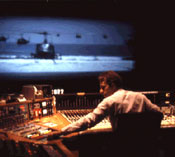Vet Your Editor’s Ego
One of the biggest reasons directors fire their editors is role confusion. Either the director thinks they’re an editor, or the editor is a closet director.
In the indie world, job descriptions frequently overlap, but it’s useful to envision the director as the film’s captain and ultimate creative decision-maker.
The editor is the first mate, a structural navigator, and storytelling specialist. Now, since you can’t afford to get this part wrong in today’s economy, how do you trust your editor to steer the right course while you maintain control of the ship?
One way to do this is to check references. Ask fellow directors how your potential editor was to work with and how they handled conflict. Speaking of conflict… it’s inevitable.
When ideas jostle about in a creative brew, ideally your editor will have the courage and conviction to make her case–more than once if needed–and the grace to leave the final decision to you. Be aware that ego-deflection can be difficult given that your editor’s name will be attached to your project.
Editor Vivien Hillgrove, an editor with a spectacular 40-year, award-winning career, says that she tries to “read” what the director really wants and stay focused on that. Each director has a theme or arc that one has to intuit. “But I’m a pretty bossy doe and will fight for what I think is deep in the director’s heart,” adds Hillgrove, “and some directors may not like that. The bottom line is that I have their baby in my hands and I want to be sure that they are not humiliated or embarrassed when they go out there and that the film is what they truly want to say.”
Another way to observe your editor’s sense of boundaries and decorum is to audition them first as a Story Editor. Before spending thousands of dollars to have them watch your 150 hours of footage and edit an assembly cut, hire them for one day to give you advice on story structure.
Assess their reaction when you question or disagree with them. Do they listen to and engage with your ideas? Or are they stuck on their own story?
You too, my dear director, need to watch out for role confusion.
One of the saddest stories I’ve heard about a malfunctioning relationship involved a director who went through four editors, blaming each for not listening to his ideas.
I had to wonder if he was the one who was not listening, because perhaps he was so intent on knowing how to structure the film. If you’re prepared to let an expert help craft your story, then hire a good editor and give them space to do their job.
If not, edit your own film–and beware that you may not have the requisite perspective. In that case, hire a top-notch Story Editor.
Finally, if you are co-directing a film, watch out for dysfunctional triangle dynamics, such as your editor playing favorites, or the two directors playing good cop/bad cop.
Most of these dynamics can be diffused if your editor knows how to leave his ego at the door. A supportive editor will encourage the two of you, thank you both and make it clear she appreciates your roles as the vision-holders and driving team behind the film.
My company New Doc Editing currently has a talented editor available. If you are in or approaching post-production, please email me at Karen@newdocediting.com to find out more about how we might work together.
